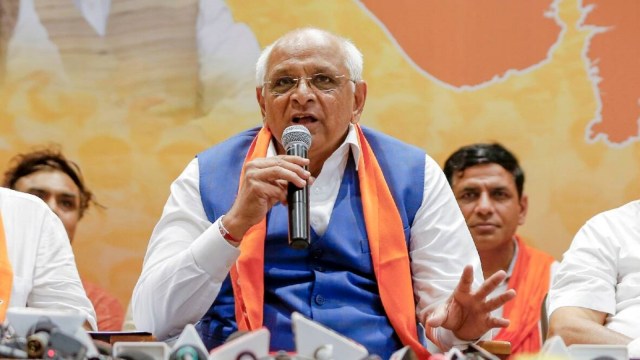Express Exclusive | AC offices, shorter meetings, Japanese philosophy: Administrative Reforms Commission submits report to Gujarat CM to increase govt productivity
The Commission was announced last month during the ongoing budget session and submitted its first report to CM Bhupendra Patel on Wednesday
 Gujarat Chief Minister Bhupendra Patel
Gujarat Chief Minister Bhupendra PatelThe Gujarat Administrative Reforms Commission (GARC), in its first report submitted to Chief Minister Bhupendra Patel Wednesday, has recommended installing air conditioners in government offices to increase productivity, holding meetings offline only when “stakeholders’ inputs are necessary”, and concluding them in “under an hour”.
Headed by Dr Hasmukh Adhia, a former Union Finance Secretary and Principal Advisor to the CM, the first GARC report was prepared a month after the commission was appointed. It recommends replacing a 1989 Government Resolution (GR), “when air conditioning was considered an elite facility” that entitled only government officials in pay level 13 (typically joint secretary and above) to air conditioned offices, with a GR that allows all officials above Class 2 (pay level 8 and above) to have ACs.
Inspired by the Japanese administrative philosophy Kaizen, which focuses on “continuous improvement through small acts of organisation that create harmonious workplaces”, the GARC report recommends taking government employees’ perspectives into account as they interact with citizens frequently and have a “practical view of processes”.
The commission advised installing QR codes and suggestion boxes “in strategic locations within government departments and office facilities throughout the state” so people can give feedback anonymously by writing or voice recordings.
Cooling down
The report states that the mean temperature in Gujarat in the last 33 years (1986 to 2019) increased by 2.9 degrees Celsius and how by the end of the 21st century, temperatures in Gujarat “could rise by 1.5°C to 5°C, depending on various climate change scenarios”.
It suggested that priority should be given to large office complexes like the Sachivalaya and offices of heads of department and collectors where “centralised systems” can be installed. In the second phase, the remaining government offices that witness a “high footfall” will be air-conditioned. The commission has also recommended that these be run on solar power.
“The government shall take steps to install rooftop solar at each government office wherever feasible as per the existing government scheme so that by 2026, government offices may have reached the zero energy bill, resulting in considerable savings for the exchequer,” the report states.
Streamlining work
Referring to the Vedic era when “sabhas” were crucial for governance, the report stresses on effective management of meetings, which should be scheduled at least “three days” in advance unless about urgent matters. The commission suggests all meetings involving outstation participants be held virtually “unless in-person presence is mandatory”.
It suggested upgrading the e-Sarkar meeting scheduler and added that “all recurring meetings start with an ‘action taken’ report reviewed by the chairperson”. The report also encourages “active dialogue from all participants” and says young professionals and junior officials should share insights with seniors. It suggests that minutes of the meetings be prepared and circulated within 24 hours
Maintaining clean work environments and “de-cluttering” is another recommendation of the GARC based on Kaizen.
The report suggests installing standard multilingual signage with clear information about the services offered, ensuring that citizens can easily navigate government offices.
The GARC was announced last month during this year’s budget session to introduce key reforms in the state’s administrative framework. Apart from chairperson Dr Adhia, the GARC includes Chief Secretary Pankaj Joshi, Additional Chief Secretary Kamal Dayani, Principal Secretaries Mona Khandhar and Dr T Natarajan, and Member Secretary Hareet Shukla.







